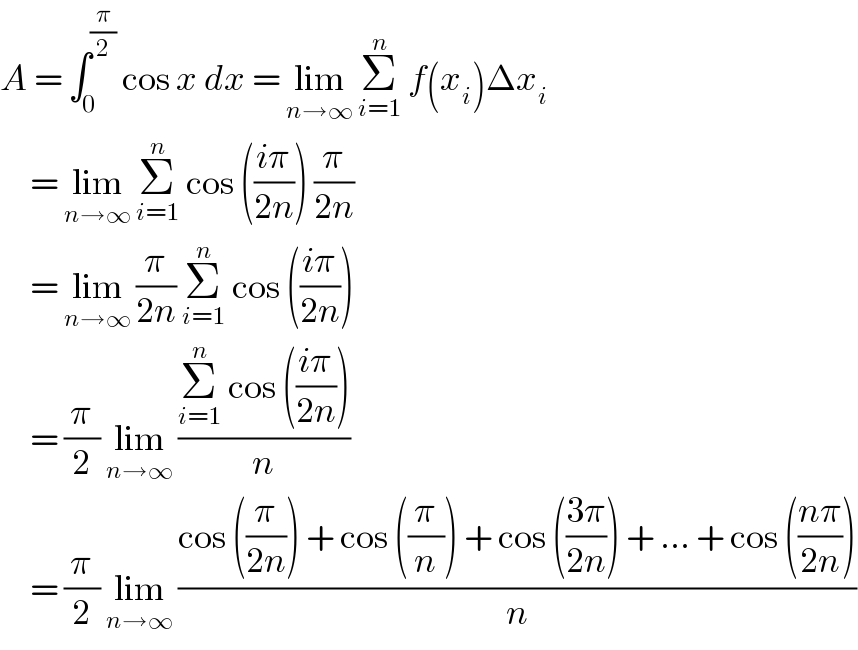Question Number 31141 by Cheyboy last updated on 03/Mar/18
![using the limit defination find the area of f(x)= cos(x) [0,π/2]](https://www.tinkutara.com/question/Q31141.png)
$$\boldsymbol{{using}}\:\boldsymbol{{the}}\:\boldsymbol{{limit}}\:\boldsymbol{{defination}} \\ $$$$\boldsymbol{{find}}\:\boldsymbol{{the}}\:\boldsymbol{{area}}\:\boldsymbol{{of}} \\ $$$$\boldsymbol{{f}}\left(\boldsymbol{{x}}\right)=\:\boldsymbol{{cos}}\left(\boldsymbol{{x}}\right)\:\:\left[\mathrm{0},\pi/\mathrm{2}\right] \\ $$
Answered by Joel578 last updated on 03/Mar/18

$${A}\:=\:\int_{\mathrm{0}} ^{\frac{\pi}{\mathrm{2}}} \:\mathrm{cos}\:{x}\:{dx}\:=\:\underset{{n}\rightarrow\infty} {\mathrm{lim}}\:\underset{{i}=\mathrm{1}} {\overset{{n}} {\sum}}\:{f}\left({x}_{{i}} \right)\Delta{x}_{{i}} \\ $$$$\:\:\:\:\:=\:\underset{{n}\rightarrow\infty} {\mathrm{lim}}\:\underset{{i}=\mathrm{1}} {\overset{{n}} {\sum}}\:\mathrm{cos}\:\left(\frac{{i}\pi}{\mathrm{2}{n}}\right)\:\frac{\pi}{\mathrm{2}{n}} \\ $$$$\:\:\:\:\:=\:\underset{{n}\rightarrow\infty} {\mathrm{lim}}\:\frac{\pi}{\mathrm{2}{n}}\:\underset{{i}=\mathrm{1}} {\overset{{n}} {\sum}}\:\mathrm{cos}\:\left(\frac{{i}\pi}{\mathrm{2}{n}}\right) \\ $$$$\:\:\:\:\:=\:\frac{\pi}{\mathrm{2}}\:\underset{{n}\rightarrow\infty} {\mathrm{lim}}\:\frac{\underset{{i}=\mathrm{1}} {\overset{{n}} {\sum}}\:\mathrm{cos}\:\left(\frac{{i}\pi}{\mathrm{2}{n}}\right)}{{n}} \\ $$$$\:\:\:\:\:=\:\frac{\pi}{\mathrm{2}}\:\underset{{n}\rightarrow\infty} {\mathrm{lim}}\:\frac{\mathrm{cos}\:\left(\frac{\pi}{\mathrm{2}{n}}\right)\:+\:\mathrm{cos}\:\left(\frac{\pi}{{n}}\right)\:+\:\mathrm{cos}\:\left(\frac{\mathrm{3}\pi}{\mathrm{2}{n}}\right)\:+\:…\:+\:\mathrm{cos}\:\left(\frac{{n}\pi}{\mathrm{2}{n}}\right)}{{n}} \\ $$
